Related Research Articles

Christiane Hörbiger was an Austrian stage, film, and television actress. Her first major film role was Mary Vetsera in Kronprinz Rudolfs letzte Liebe in 1955. She appeared on the stage of the Burgtheater as Recha in Lessing's Nathan der Weise in 1959, became a member of Theater Heidelberg and later Schauspielhaus Zürich. From 1969 to 1972, she portrayed Die Buhlschaft in Hofmannsthal's Jedermann at the Salzburg Festival.

Hans Moser was an Austrian actor who, during his long career, from the 1920s up to his death, mainly played in comedy films. He was particularly associated with the genre of the Wiener Film. Moser appeared in over 150 films.

Heinrich Wilhelm "Heinz" Rühmann was a German film actor who appeared in over 100 films between 1926 and 1993. He is one of the most famous and popular German actors of the 20th century, and is considered a German film legend. Rühmann is best known for playing the part of a comic ordinary citizen in film comedies such as Three from the Filling Station and The Punch Bowl. During his later years, he was also a respected character actor in films such as The Captain from Köpenick and It Happened in Broad Daylight. His only English-speaking movie was the 1965 Ship of Fools.
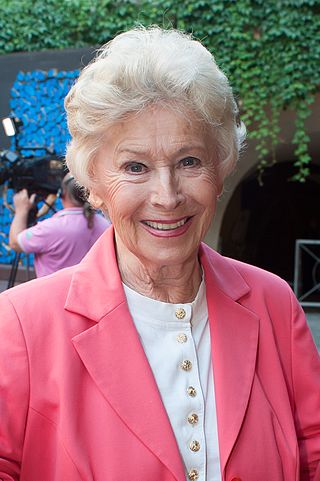
Waltraut Haas is an Austrian actress and singer.
Eduard von Borsody was an Austrian cameraman, film editor, film director, and screenplay writer.

Mariandl is a 1961 Austrian drama film directed by Werner Jacobs and starring Cornelia Froboess, Rudolf Prack and Waltraut Haas. It was followed by a sequel Mariandl's Homecoming in 1962. A girl living in a hotel aspires to a musical scholarship.
Mariandl's Homecoming is a 1962 Austrian musical drama film directed by Werner Jacobs and starring Cornelia Froboess, Rudolf Prack and Waltraut Haas. It is a sequel to the 1961 film Mariandl.

Rudolf Prack was an Austrian film actor.

Paul Hörbiger was an Austrian theatre and film actor.
Immer die Radfahrer is a 1958 Austrian / West German comedy film directed by Hans Deppe.

Maria Ilona is a 1939 German historical drama film directed by Géza von Bolváry and starring Paula Wessely, Willy Birgel, and Paul Hörbiger. The film is set in Austria during the reign of Ferdinand I. It is an adaptation of Oswald Richter-Tersik's novel Ilona Beck.

The Happy Wanderer is a 1955 West German romantic comedy film directed by Hans Quest. It stars Rudolf Schock, Waltraut Haas, Elma Karlowa, and Willy Fritsch. It was shot in Agfacolor at the Tempelhof Studios in West Berlin and on location in Bavaria. The film's sets were designed by the art director Hans Kuhnert.
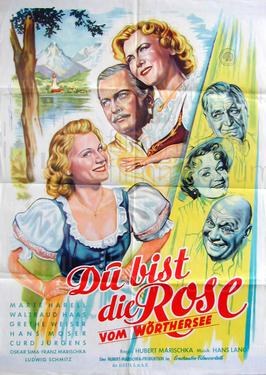
Rose of the Mountain is a 1952 West German musical comedy film directed by Hubert Marischka and starring Marte Harell, Grethe Weiser and Waltraut Haas. It takes its German title from a popular 1947 song of the same name, which is used in the film as a melody. It was shot at the Spandau Studios in West Berlin and on location in Carinthia at the Hotel Karawankenblick in Pörtschach and around the lake of Wörthersee. The film's sets were designed by the art directors Willi Herrmann and Heinrich Weidemann.
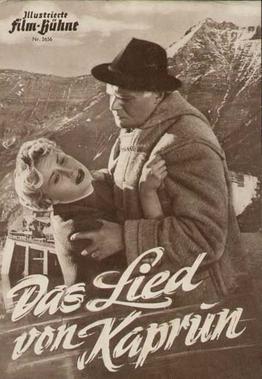
The Song of Kaprun or The Song of the Hohe Tauern is a 1955 Austrian-German drama film directed by Anton Kutter and starring Waltraut Haas, Albert Lieven and Eduard Köck. It is set in Kaprun in the High Tauern mountain range.
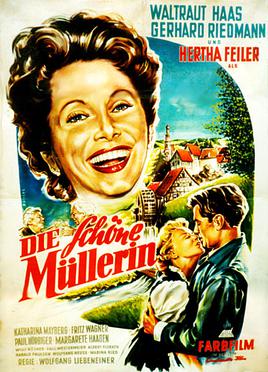
The Beautiful Miller is a 1954 West German romantic drama film directed by Wolfgang Liebeneiner and starring Waltraut Haas, Gerhard Riedmann and Hertha Feiler.

The Witch is a 1954 West German drama film directed by Gustav Ucicky and starring Anita Björk, Karlheinz Böhm and Attila Hörbiger. It was shot at the Tempelhof Studios in Berlin and on location in Vienna, Rome, Venice, Capri and Styria. The film's sets were designed by the art director Emil Hasler and Walter Kutz.
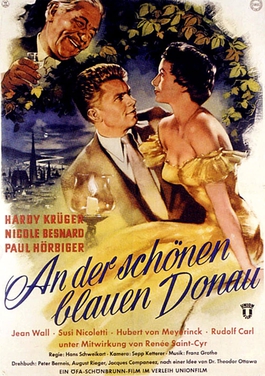
The Blue Danube is a 1955 Austrian romantic comedy film directed by Hans Schweikart and starring Hardy Krüger, Nicole Besnard and Paul Hörbiger. It was shot at the Schönbrunn Studios in Vienna and on location around the city. The film's sets were designed by the art director Fritz Jüptner-Jonstorff.

And Who Is Kissing Me? is a 1956 Austrian comedy film directed by Max Nosseck and starring Hans Moser, Grethe Weiser, Theo Lingen and Johannes Heesters, who each play themselves. The film's sets were designed by the art director Felix Smetana. Location shooting took place in Vienna. It is not a remake of the 1933 German film And Who Is Kissing Me?. The film is also known by the alternative title Ein Herz und eine Seele.

Hello Porter is a 1952 Austrian comedy film directed by Franz Antel and starring Paul Hörbiger, Hans Moser and Maria Andergast. It was shot at the Schönbrunn Studios in Vienna. The film's sets were designed by the art director Felix Smetana. Hörbiger and Moser appeared again together in the 1958 film Hello Taxi.
References
- ↑ "70 Jahre "Hofrat Geiger": Schuld war keine politische Kategorie - derStandard.at". DER STANDARD (in Austrian German). Retrieved 2019-08-29.
- ↑ "Vor 125 Jahren geboren: Paul Hörbiger - Der "personifizierte Folklore-Wiener"". Deutschlandfunk Kultur (in German). 29 April 2019. Retrieved 2019-08-29.
- ↑ "Waltraut Haas im Interview: Mariandl erzählt vom Donauweibchen". kurier.at (in German). 23 June 2019. Retrieved 2019-08-29.